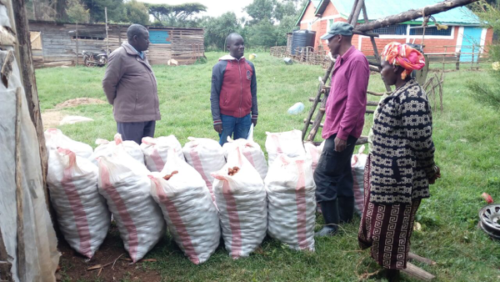Isaiah Kemei is one of progressive seed potato multipliers in Kenya’s Uasin Gishu County. Before becoming a seed potato multiplier in 2016, Isaiah had been planting potatoes for sale at the local markets for more than seven years.
“At that time I used to experience high disease incidence especially bacterial wilt in my potato fields and my yields were very low, less than 10 t/ha” said Isaiah.
Under the ongoing Feed the Future funded Kenya Accelerated Value Chain Development (AVCD) project Isaiah has learned the art of producing quality seed potato. In 2016, he attended a two-day training on seed potato production facilitated by the AVCD project in collaboration with the Uasin Gishu County Government. Thereafter, Isaiah bought his first lot of 0.5 tonnes of certified seed during the 2016 long rains (March-April-May).
He has since expanded his seed potato production by committing more land. Also, he has constructed a diffused light store (DLS) with a one tonne capacity. DLSs make use of indirect natural light and good ventilation to control excessive sprout growth and associated storage loss in potatoes.
Selecting the right potato variety
Although Isaiah’s first certified seed lot were of Kenya Mpya potato variety, he has since strategized by acquiring Shangi, a variety popular with farmers in his county. During the 2016 short rains (October to December), Isaiah was one of three seed multipliers who pioneered use of rooted cuttings in the county for production of elite early generation seed of Shangi and Unica varieties. Currently, Isaiah has more than one acre of Unica, a climate smart variety with heat and drought tolerance traits, high yielding and pest and disease resistance characteristics.

According to Joseph Waiyeki, the ward agricultural officer, Ainabkoi/Olare ward, farmers in his ward have benefited much from Isaiah’s farm who produces quality seed potato of their preferred variety. “Isaiah is a good potato entrepreneur who embraces technologies including new varieties. Because of this, the county has constructed a model ambient cold storage facility on his farm” said Joseph.
“I bought seed from Isaiah in October 2017 and I am impressed by the uniform crop and fairly good yields despite very low rainfall received during the October to December rainy season. Initially, I thought the cost of Isaiah’s seed was very high but now I am glad I bought the quality seed” said Abraham Choge.
This is in contrast to James Tuwei who wanted to buy seed from Isaiah but changed his mind when he was told the unit price per 50kg bag (Kes 2,000, approximately USD 20). He opted to buy tubers from the market at a price of Kes 1,000 (USD 10) for a 70-kg bag. When James met Isaiah recently, he regretted that he didn’t buy the quality seed from him. “Now I know cheap is expensive especially for seed potato. My field was totally destroyed by tuber borne diseases” said James Tuwei
Certainly, the biggest challenge to potato production is limited access to quality seed and Isaiah is helping solve this problem in his ward. “I received many calls from farmers looking for more seed after seeing the performance of seed they bought earlier or from their neighbors who bought my seed. So getting the seed production right remains my moto” Isaiah concluded.
On 5 -7 July, 2017, Isaiah was one of 17 decentralized seed multipliers who participated in a three-day tour to learn practices and requirements for production of certified seed. His ultimate goal is to invest in an irrigation system so that he can maximize his returns and mitigate moisture stress during low rainfall seasons.
Story by Dinah Borus, Field Cordinator – International Potato Center
